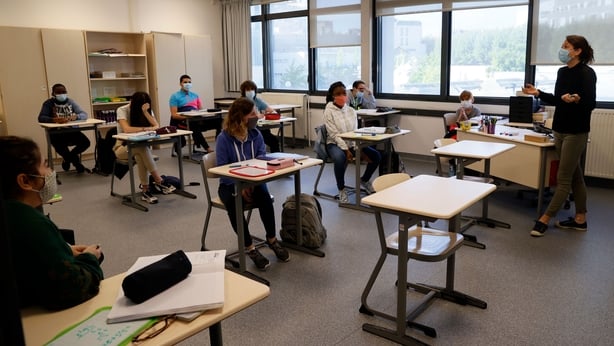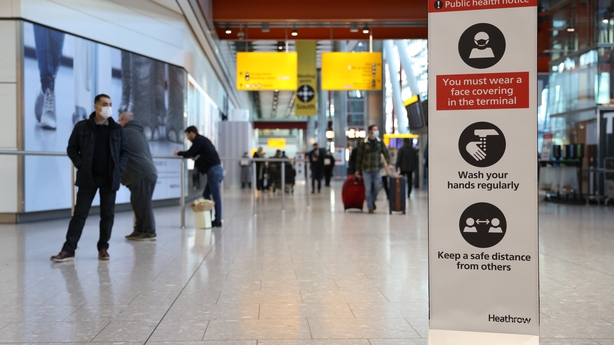The French Prime Minister has said that in response to a rapid spread of the Omicron variant of Covid-19, the government is narrowing the delay for a third booster shot to three months from four, but there will be no curfew for New Year's Eve.
Jean Castex also said that from today and for the next three weeks, all public gatherings will be limited to 2,000 people for indoor events, and to 5000 people for outdoor events.
Consumption of drinks and food will be banned in long-distance transport as well as in movie theaters and homeworking will become mandatory for at least three days per week where possible, Mr Castex said.
The government has also decided to make face masks mandatory outdoors in city centers, under the authority of local government representatives.
"I know that it feels like a film without ending, but a year ago we started our vaccination campaign and now we are one of the best vaccinated and best protected people in the world," Mr Castex told a news conference following a cabinet meeting.

Covid-related disruption causes travel chaos
Thousands of flights are being cancelled globally due to staff shortages caused by the coronavirus.
Since Christmas Eve, around 8,000 flights have been cancelled, causing chaos for those intending to travel.
2,000 flights have been cancelled today, the majority of those in the US, where airlines have blamed the disruption on crews testing positive or isolating.
A spokesperson for the Dublin Airport Authority has said that lengthy queues at Dublin Airport this evening were due to the large volume of post Christmas passengers travelling, and the impact the Omicron variant has had on staff absence, due to a number of security officers being deemed close contacts.
Passengers have been facing long queues at security today.
Dublin Airport said that all available resources have been deployed to assist and that the airport regrets the obvious inconvenience caused to passengers.
In New York, a vaccine mandate for private company workers comes into place today.
In China, 13 million people in Xian are under strict lockdown, and from today can no longer use their cars.
European countries are also tightening up restrictions.
Denmark now requires a negative PCR test for travellers, regardless of vaccine status.
France is grappling with a record number of infections and will discuss new safety measures later.
Scotland is closing nightclubs from today and returning to table service only for hospitality.
But England is at odds with other parts of the UK, and Boris Johnson is not expected to announce further restrictions after being briefed on the spread of the Omicron variant.
Read more:
Latest Coronavirus stories
Australia records first Omicron variant death
Australia has reported its first confirmed death from the new Omicron variant of Covid-19 amid another surge in daily infections, however authorities have refrained from imposing new restrictions as hospitalisation rates remain low.
The death, a man in his 80s, marked a grim milestone for the country which has had to reverse some parts of a staged reopening after nearly two years of stop-start lockdowns, due to the fresh outbreak.
Omicron, which health experts say appears more contagious but less virulent than previous strains, began to spread in the country just as it lifted restrictions on most domestic borders and allowed Australians to return from overseas without quarantine, driving case numbers to the highest of the pandemic.
Authorities gave no additional details about the Omicron death, except to say that the man caught the virus at an aged care facility and died in a Sydney hospital.
"This was the first known death in New South Wales (state) linked to the Omicron variant of concern," said NSW Health epidemiologist Christine Selvey in a video released by the government.
The man was among six Covid-19 deaths reported in Australia the previous day, all in the most populous states of NSW and Victoria, which are home to more than half the country's 25 million population.

Australia clocked just over 9,400 new cases today, slightly down from the previous day's record but not including cases from the state of South Australia, which was yet to report its numbers. Most new cases were in NSW and Victoria.
"Although we are seeing increased case numbers... we are not seeing the impacts on our hospital system," said Annastacia Palaszczuk, premier of Queensland which reported 784 new cases with four people in hospital.
With reports of six-hour wait times for Covid testing for people hoping to meet requirements for interstate holiday travel, Ms Palaszczuk defended the tourism-friendly state for mandatory testing, saying "everyone knew when they booked a ticket that if they wanted to come here they would have to do a PCR test".
However, she added that Queensland was considering whether to relax testing requirements for domestic visitors. Tasmania, another tourist-popular state, also said it was considering changes to state border testing rules.
Around the country, the surge in infections meanwhile weighed on testing resources.
Sydney testing clinic SydPath had confirmed a day earlier that it wrongly told 400 Covid-positive people they were negative in the days before Christmas; today it now realised it sent wrong result messages to another 995 people.
Australian authorities have so far resisted a return to lockdown in the face of surging case numbers but have reinstated some restrictions.
NSW has again made it compulsory to check into public venues with QR codes, while many states have brought back mandatory mask-wearing in indoor public places.
The country has also narrowed the window for vaccine booster shots from six months to four months, soon to be three months.

